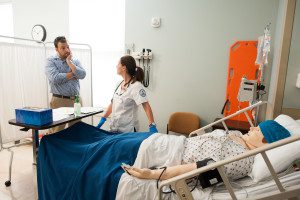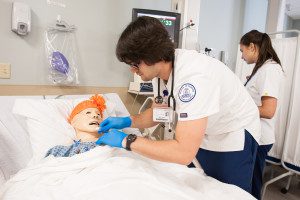 With an emphasis on experiential learning, Belmont’s School of Nursing provides students with the opportunity to participate in human simulation labs. For Nursing Instructor Sara Camp’s Adult Health II students, this meant taking part in an End of Life lab that simulated the death of a patient, with a volunteer acting as a grieving family member.
With an emphasis on experiential learning, Belmont’s School of Nursing provides students with the opportunity to participate in human simulation labs. For Nursing Instructor Sara Camp’s Adult Health II students, this meant taking part in an End of Life lab that simulated the death of a patient, with a volunteer acting as a grieving family member.
When the participating students arrived, they were aware of their patient, Lisa’s, prognosis. Equipped with her report, they were tasked with guiding Lisa and her family member through her final stages of life. As Lisa’s heart rate and pulse slowed, the volunteer family member’s questions sped up. Similar to what would occur in a hospital setting, students were responsible for providing care and comfort for the patient, while assisting the family during a particularly challenging time.
Belmont University Web and Marketing Developer Jon Blankenship participated in the simulation because of a personal connection he has to caregivers who specialize in end of life treatment. His father was recently diagnosed with end stage colon cancer and through the experience, “the one constant we have is how wonderful Dad’s nurses are to him and to us,” Blankenship said. The opportunity to contribute to the education of a nurse who could play that same role for a family in the future was what made Jon sign on. For those nurses, “there aren’t enough thanks to give,” he said.
Camp is committed to equipping students with the skills needed to care for the family system, not just the patients they are assigned. Often, nurses are expected to be experts on caring for patients in their final stages of life in a hospital, regardless of their training or comfort level. Camp said many bedside nurses aren’t confident in the end of life training they have received and because of that, are not adequate resources for new nurses to turn to. “Given that the end of life is such an important event in the life of our patients and their families, it seems irresponsible to leave this to on the job training,” she said.
Senior nursing major and simulation participant Blair Bailey would agree. “It is nice to have practiced skills in lab, prior to actually performing the skills in the hospital,” she said. “I will definitely be able to take what I learned from this simulation and take the experience into the real world as a nurse.”
 In a debrief following the simulation, senior nursing major Mark Wolter, discussed the challenge of moving from a proactive treatment mentality to one that comforts the family and patient through the final stages of life. Because of Lisa’s signed DNR and DNI, once the final stages of life had come, there was no medical intervention that could be done. Instead of working to raise a heartbeat once it had dropped, the care team was responsible for ensuring the comfort and ease of both the patient and the family. “At this point in a patient’s care, you are treating everyone close to the patient, and you realize the impact that you can have as a nurse in keeping the situation as peaceful as possible,” he said.
In a debrief following the simulation, senior nursing major Mark Wolter, discussed the challenge of moving from a proactive treatment mentality to one that comforts the family and patient through the final stages of life. Because of Lisa’s signed DNR and DNI, once the final stages of life had come, there was no medical intervention that could be done. Instead of working to raise a heartbeat once it had dropped, the care team was responsible for ensuring the comfort and ease of both the patient and the family. “At this point in a patient’s care, you are treating everyone close to the patient, and you realize the impact that you can have as a nurse in keeping the situation as peaceful as possible,” he said.
Through this and countless other simulations included in Belmont’s program, students are given the opportunity to practice their skills through first hand experiences, preparing them for clinicals and post-graduation careers. Wolter said he is grateful for the emphasis Belmont puts on experiential learning and knows the program continues to advocate for more and more opportunities. “I’m a nail and hammer kind of learner, so that has helped me in a profound way,” he said. “The experiences I have had while at Belmont are beneficial because I have had varying experiences that I will build from in my first job and first few years as a nurse. I am thankful.”


